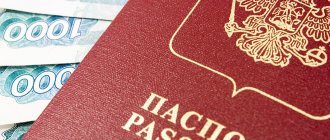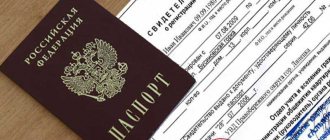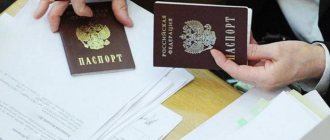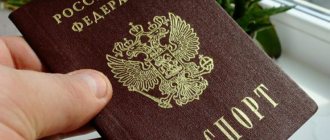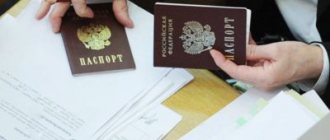Home / Real estate / Housing rights / Registration / Responsibility
Back
Published: 10/25/2017
Reading time: 6 min
0
459
Registration is one of the integral measures for a person to inform the state of his new place of residence or stay.
- Registration deadlines
- Normative base
- How to avoid a fine?
- Fine amounts
- Payment
The legislative framework
The procedure for registering Russian citizens is regulated by Government Decree No. 713 of July 17, 1995, Law on Freedom of Movement No. 5242-1 (in force since June 25, 1993) and Order of the Ministry of Internal Affairs of the Russian Federation No. 984 (adopted December 31, 2017).
As for foreigners, the following regulations apply to them:
- Federal Law No. 109 “On Migration Registration”;
- Government Decree No. 9 of January 15, 2007
- Order of the Ministry of Internal Affairs No. 514.
Failure to comply with legal requirements regarding permanent or temporary registration is punishable in accordance with Art. 19.15.1 and 18.8 of the Administrative Code (for Russians and foreigners, respectively).
In addition to sanctions from the state, the lack of residence permit (registration) entails a number of additional inconveniences associated with the inability to perform certain actions or use services. This applies, in particular, to receiving medical care under compulsory medical insurance, loans from banks or microfinance organizations, enrolling a child in kindergarten, etc.
How to pay for overdue registration at the place of residence?
You can pay a fine for overdue registration in the same way as paying any government debt.
A protocol on the offense will be drawn up by an employee of the passport office, provided that he has the appropriate powers.
Or a representative of the Federal Migration Service will do it.
Payment can be made at any bank or Russian Post office . This can also be done using the “Public Services” portal on the Internet. To do this, just select the “Payment for services” section on the website.
IMPORTANT! Many branches of the Federal Migration Service and passport offices have cash desks where you can pay the state and immediately issue the necessary document.
Types of registration
In Russia there is permanent and temporary registration of citizens. In the first case, we mean registration at the place of permanent residence or actual stay (house, room, apartment).
As for temporary registration, it applies to citizens who are not permanently at the specified address, but only for a certain period of time.
Similar rules apply to foreigners. A situation is allowed when a person has both temporary and permanent registration. However, the presence of several permanent and temporary registrations is excluded.
Article in Russia that postpones punishment
Article 19.15 of the Code of Administrative Offenses contains a provision not only on penalties, but also notes when citizens who violate the law are not required to pay a fine.
These categories include:
- Citizens temporarily registered in a region or locality in the relevant state entity.
- Citizens located in federal cities with registration at the place of residence in apartments/houses located in the same region.
- Persons without temporary registration, whose close relatives have housing under property rights or a lease agreement.
- Persons living together with owners/tenants and being related to them.
What is the fine for not having registration in your passport?
The amount of financial sanctions depends on the circumstances of the offense, the actual location of the perpetrators and is:
- for a citizen of the Russian Federation who does not have a residence permit - from 2 to 3 thousand rubles (in St. Petersburg and Moscow - from 3 to 5 thousand rubles);
- for tenants and owners of premises (individuals) – from 2 to 5 thousand rubles (in St. Petersburg and Moscow – from 5 to 7 thousand rubles);
- for tenants and owners of premises (legal entities) - from 250 to 750 thousand rubles (in St. Petersburg and Moscow - up to 800 thousand rubles).
As for unregistered foreigners, they are subject to a fine of 2 to 5 thousand rubles with or without possible deportation. If the violation occurred in St. Petersburg (Leningrad Region) or Moscow (Moscow Region), the fine will increase to 5 - 7 thousand rubles (with or without deportation). A similar punishment is provided for a repeated violation within a year (with unconditional deportation from the country), and for Moscow and St. Petersburg (including the Moscow and Leningrad regions) - from 7 to 10 thousand rubles (plus deportation).
Is it possible to avoid punishment?
If a foreigner plans to stay in Russia for a long time, then he must study the rules of registration in the state in advance. If he does not complete the required actions within the prescribed time, he will have to face punishment in the form of a fine or other unpleasant consequences.
You can avoid punishment only if there are compelling reasons, for example, if you are in hospital with a serious illness. But for this you need to obtain an appropriate medical certificate.
When a fine is not imposed
Upon arrival at a new place of residence, a citizen must deregister from his previous registration and register at a new address within 7 days. If he already has a permanent residence permit, then the law allows 90 days to obtain temporary registration. No fines will be imposed during these periods.
Failure to register in a passport is not punishable in the following cases:
- If a person lives with his close relative, registered at this address and who is the owner of the living space. These include parents, children, grandparents, grandchildren, and spouses.
- If a person is officially registered in a given city and lives in the same city, but at a different address.
- If a person is officially registered in the region and lives on the territory of a given subject of the federation. For example, a resident of the Leningrad region does not need temporary registration for the period of residence in St. Petersburg.
A fine may not be imposed if the person with missing registration has valid reasons - for example, emergency hospitalization, emergency business trip or difficult life circumstances.
How quickly do I need to register my newborn?
To register a child, 30 days are given from the date of his birth. If there is no registration, parents may be fined 2-3 thousand rubles.
Registration of children follows a simplified procedure. In particular, there is no need to obtain the owner's consent. Children will be registered at the parents' registration address in any case.
Pregnant women need to take into account that without registration they may not be admitted to the maternity hospital, or the child may not be discharged from the maternity hospital until the mother registers at some address.
Is it possible to challenge the imposition of a fine?
The legislation provides a period of 10 days for appealing the administrative protocol. If the fine is not contested within this time, the decision to impose a penalty will enter into force.
Russian citizens may pay a fine for failing to register within 60 days. As for foreigners, they are required to repay the debt the next day after the collection order comes into force (if deportation is not ordered).
Payment rules
How many days will the payment be overdue?
After a violation is identified, that is, the fact of overdue registration, an administrative protocol on the offense is drawn up, and then the violator receives a resolution, which will spell out the measure provided for such a violation of the norm.
The offender receives copies of this document. The resolution comes into effect after 10 days from the time the citizen who violated the law received copies of documents. From now on, he has 60 days to pay off the administrative fine. This norm is enshrined in Article 32.2 of the Code of Administrative Offenses of the Russian Federation.
There are several ways to pay an administrative fine:
- through the Internet bank, where you need to log into your personal account and enter the UIN number in the appropriate tab, and then make a debit from the card;
- at the bank through a cashier, you just need to make sure that the financial organization accepts payments for administrative offenses;
- through terminals designed for self-service: in it, select the “payment of fine” section and enter the resolution number, after which you deposit funds.
After making the payment, the receipt must be saved. There is no need to present it to the organization for administrative offenses. Sometimes confusion can arise if payment was made without indicating the debtor's name. In this case, funds may arrive late.
Sanctions for delay
If the fine is not paid within three months, then another resolution is drawn up in the name of the debtor, regulated by Article 20.25 of the Code of Administrative Offenses of the Russian Federation. In accordance with this, the debtor faces the following types of punishment:
- if a fine was previously issued, then after non-payment the amount doubles, and the payment must be made taking into account the new accrued amount;
- arrest for up to 15 days;
- compulsory work for up to 50 hours.
If the Resolution is made, but the amount due for credit for the administrative offense has not been paid, then it follows that the materials will be transferred to the bailiffs, who will carry out collection measures.
Who obliges to pay the fine and how?
Any official can detect the lack of registration. As a rule, these are local police officers who can check documents and identify violations.
The district police officer may make the following demands:
- Order to correct the violation of the law in the next 7 days without a fine. For example, if the period of residence without registration was short;
- Issue a fine and order to correct the violation within a week. If a citizen does not comply with the first point, the case is sent to court, and this money is recovered from the person through bailiffs. If a citizen ignores the second order, the fine will be doubled.
Precinct police cannot cover the entire population; first of all, foreign citizens come under close attention. If a foreigner continues to evade registration, he may be expelled from the country.
Fine for property owner for refusing to register tenants
However, it is not only residents who are at risk of punishment. Apartment owners are also liable under the Code of Administrative Offenses of the Russian Federation. The essence of the offense is that citizens and legal entities do not want to register people on their territory. If employees of authorized state bodies (GUVM of the Ministry of Internal Affairs of the Russian Federation) reveal such facts, then after drawing up protocols, large fines will be imposed.
Currently, the fight against fictitious registrations is underway. This means that owners of residential space register citizens who do not actually live at this address. But the law has not yet established the maximum number of people that can be registered in an apartment.
How to find out whether a foreigner from the Russian Federation is deported or not - is it possible to do this via the Internet?
Time limits for registration
Registration information is needed, first of all, to record the movement of citizens.
- Permanent registration is a mandatory procedure from the moment of birth. The baby is registered in the same living quarters with one of the parents, usually the mother. In the future, if the adult’s place of residence changes (for example, buying a new apartment after selling the old one), within 7 days you need to get a note in your passport about the new place of stay.
- Temporary registration. A person may be registered in one city, but permanently live in another, in a rented apartment, with friends or relatives. If the period of absence from the place of registration is more than 90 days (3 months) , you need to obtain a temporary certificate of residence. It can be issued for a period from 1/2 year to 5 years . Upon expiration of the document, it can be extended for the desired period.
- For foreign citizens living in the Russian Federation for up to 3 months , registration is not required. Those who plan a long stay in the country, work or study here, apply for a temporary certificate for up to 3 years . It may also be extended in the future.
